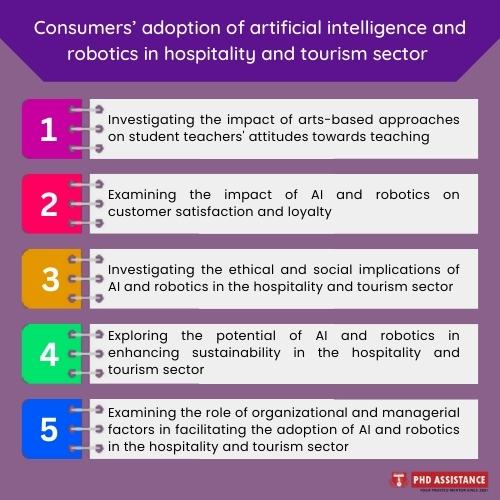Future thesis topic for “Consumers’ adoption of artificial intelligence and robotics – PhD Assistance
What are the future research topic recommendations for “Consumers’ adoption of artificial intelligence and robotics in the hospitality and tourism sector?
The goal of this blog, a current systematic literature review, is to synthesize the existing research on consumers’ adoption of artificial intelligence and robotics (AIR) in the hospitality and tourist sector (HATS) to acquire a thorough knowledge of it. In addition, this blog provides insights for academics, practitioners, AI marketers, developers, designers and policymakers.
Introduction
The paper “Consumers’ Adoption of artificial intelligence and Robotics in the Hospitality Management and tourism sector: literature review example and future research agenda” provides several recommendations for future research. Some of these recommendations include:

- Investigating the factors that influence consumer adoption of AI and robotics in the hospitality and tourism sector: Future research could focus on identifying the factors that influence consumer acceptance of AI and robotics in the hospitality and tourism industry. This could include exploring the role of trust, perceived usefulness, ease of use, and other psychological factors influencing consumer behaviour.
- Examining the impact of AI and robotics on customer satisfaction and loyalty: Future research could also examine the impact of AI and machine learning robotics on customer satisfaction and loyalty in the hospitality and tourism industry. This could involve exploring how these technologies impact the quality of service, the customer experience, and overall satisfaction levels.
- Investigating the ethical and social implications of AI and robotics in the hospitality and tourism sector: Future research could also focus on exploring the ethical and social implications of AI and robotics in the hospitality and tourism industry. This could include examining issues such as privacy, data security, and the potential displacement of human workers.
- Exploring the potential of AI and robotics in enhancing sustainability in the hospitality and tourism sector: Future research could also investigate the potential of AI and robotics in enhancing sustainability in the hospitality and tourism industry. This could involve exploring how these technologies can help to reduce environmental impacts and promote more sustainable practices.
- Examining the role of organizational and managerial factors in facilitating the adoption of AI and robotics in the hospitality and tourism sector: Future research could explore the role of organizational and managerial factors in facilitating the adoption of AI and robotics in the hospitality and tourism industry. This could involve examining the role of leadership, organizational culture, and other factors that influence the adoption of these technologies in the industry.
Overall, these recommendations highlight the need for further research to understand better the potential benefits and challenges associated with adopting AI and robotics in the hospitality and tourism industry. By addressing these research methodology gaps, scholars can help to inform the development of more effective strategies for leveraging these technologies in the industry.
Conclusion
The primary services and benefits recognized by users related to AIR applications in HATS were explored in this study. The main difficulties encountered by customers when using AIR-mediated services were also discussed. The authors created an example list of future research topics and an integrated antecedent result framework of AIR customer adoption behaviour in HATS based on the findings. However, certain limits, such as research published in English and the Scopus database, should be noted. Future research can be performed to fill these gaps.
PhD Assistance
Our writers and researchers have extensive experience determining the best subject and title for a PhD dissertation based on their area of expertise and personal interests. Furthermore, our specialists are drawn from top-tier colleges worldwide, including the US, the UK, and India. Our authors have the knowledge and expertise to choose a PhD research topic appropriate for your study and a brief title that will surely achieve your research objectives.
References
Goel, Pooja, et al. “Consumers’ adoption of artificial intelligence and robotics in hospitality and tourism sector: literature review and future research agenda.”Tourism Review(2022).
 Previous Post
Previous Post
